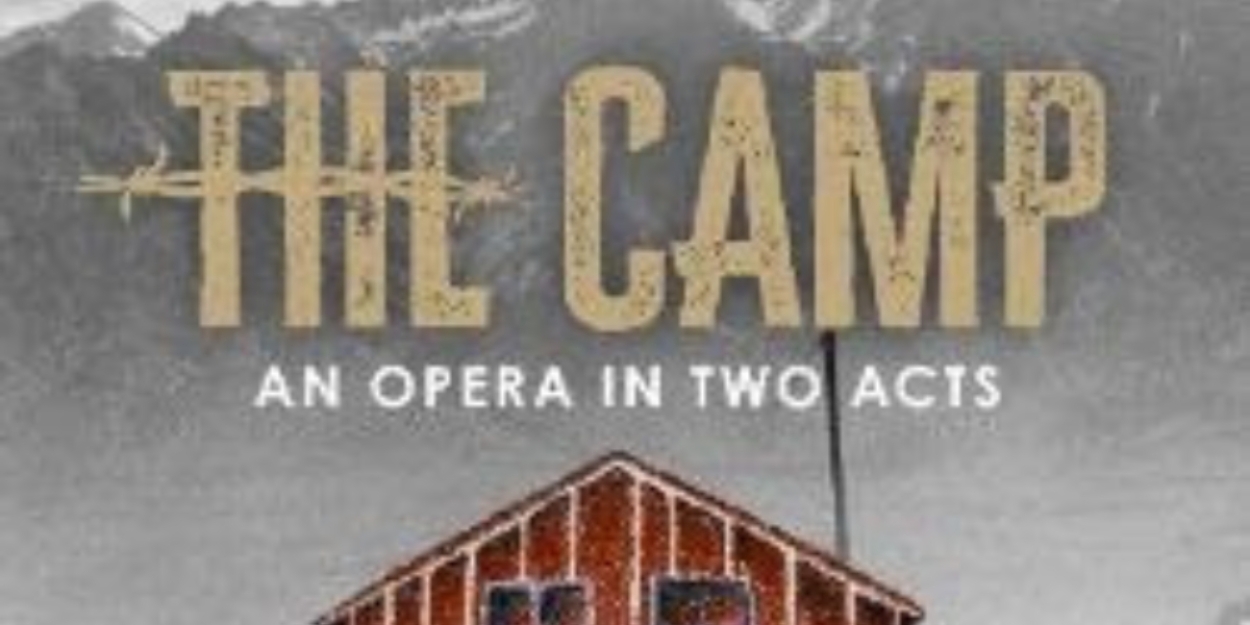THE CAMP Comes to JACCC Aratani Theatre in Los Angeles
Performances run February 22 to March 2.

In 1942, during World War II, 120,000 people of Japanese ancestry—two-thirds of whom were American citizens—were unjustly incarcerated in concentration camps within the United States. Inspired by these events, a new American opera titled The Camp makes its world premiere, presented in partnership with the Japanese American Cultural & Community Center, with four performances from February 22 to March 2, 2025 at the JACCC Aratani Theatre in Los Angeles.
Created by librettist Lionelle Hamanaka, a descendant of camp survivors, and composer Daniel Kessner, The Camp tells the moving story of the Shimono family, Japanese Americans forcibly removed from their suburban home in Southern California. After Mas, a fisherman and the head of the household, is arrested by the FBI on suspicion of espionage, the family is reunited in a desolate incarceration camp. As the family struggles to survive the emotional and physical toll of their wrongful imprisonment, this poignant, new opera illuminates the remarkable strength of familial bonds and the power of collective resistance in the face of injustice.
The premiere of The Camp will be in the iconic JACCC Aratani Theatre that is located within blocks of where, eighty-three years ago, families were loaded on buses and sent to concentration camps within the United States. Performed in English with English supertitles, the opera features an intergenerational cast of eleven singers and a twenty-two member orchestra, led by conductor Steven F. Hofer. The cast is headed by leading Los Angeles area vocalists: bass-baritone Roberto Perlas Gómez as Mas Shimono, and soprano Tiffany Ho as Suzy Shimono. Joining them are Shu Tran as Haruko Shimono, Habin Kim as Rebecca Shimono, Patrick Tsoi-A-Sue as Nobu, Krishna Raman as the Commentator, FBI Agent, and PFC Parker, Sarah Wang as Mrs. Hosaka, Steve Moritsugu as Tana, Dennis Rupp as Edwards and Reverend, Hisato Masuyama as Kenji, and Jamie Sanderson as Taylor.
This captivating production is directed by Los Angeles-born and -based director of theater and opera Diana Wyenn, whose previous work has been presented by Detroit Opera, Malmö Opera, Beth Morrison Projects, National Sawdust, Center Theatre Group, LA Phil, UCLA, and REDCAT. She is joined by associate director John Miyasaki, a Los Angeles-based arts leader whose family was incarcerated at Manzanar Concentration Camp. Completing the creative and production teams are scenic designer Yuri Okahana-Benson, lighting designer Pablo Santiago, Costume Designer Kathleen Qui, props designer Brittany White, and stage managers Darlene Miyakawa and Anthony Rivera.
On February 19, three days before the engagement, the annual Day of Remembrance is observed. February 19 is the day in 1942 that President Franklin D. Roosevelt signed Executive Order 9066, which gave the U.S. Army the authority to remove civilians from the military zones established in Washington, Oregon, and California during WWII. This wrongful detainment of Japanese Americans far exceeded any similar actions taken against the millions of German and Italian Americans.
Daniel Kessner, whose compositions have received more than 1,000 performances during this career, said, “My first opera was written half a century ago, and yet I feel like my entire composing career was leading toward this opera, which sums up a lifetime of living among people whose lives were so impacted by a dark time in our nation’s history. Even though the events of this opera are tragic, there is a catharsis, a cleansing of the soul that takes place and is needed now.”
A composer of Ukrainian Jewish heritage who grew up on the edge of Los Angeles’ Little Tokyo community in Southern California after the end of World War II, Kessner was acutely aware of this dark chapter in U.S. history because of its impact on his childhood friends and their older family members. Later in his life, he joined his high school friend Kerry Kunitomi Cababa on the annual pilgrimage to Manzanar in the Owens Valley (225 miles north and east of Los Angeles) one of ten incarceration centers operated during World War II by the War Relocation Authority (WRA) to detain Japanese Americans, and felt that the experience could find an expression in a contemporary opera.
He soon learned about the work of Lionelle Hamanaka and approached the New York-based playwright, a Sansei whose parents were incarcerated at Jerome, one of two War Relocation Authority (WRA) administered concentration camps located less than thirty miles from each other in southeastern Arkansas. These camps, Jerome and Rohwer, were so large that briefly they were the fifth and sixth largest towns in Arkansas. The result of Hamanaka and Kessner’s unique multi-year collaboration is The Camp.
“The concentration camps in the United States in World War II are a tragedy that Japanese Americans are still working to overcome and have recent historic relevance to the 12,000 racist attacks against Asian Americans nationally, as well as recent massive anti-immigrant threats,” shares librettist Lionelle Hamanaka. “My own parents were in Jerome, but the incidents in the opera come from different camps—the arrest of Mr. Shimono, lack of medical care, food stolen from the kitchen, and conflict between political views of the inmates—but they hopefully reveal the humanity that connects us all."
Lionelle’s father, character actor Conrad Yama, appeared in both the original Broadway casts of Rodgers and Hammerstein’s Flower Drum Song and Stephen Sondheim and John Weidman’s Pacific Overtures, as well as appearing in Frank Chin’s Year of the Dragon and Edward Albee’s Box-Mao-Box.
The Camp is presented in partnership with the Japanese American Cultural & Community Center (JACCC) and produced by Plain Wood Productions and Kessner Music, with associate producers Helen Ota, Katharine Means, and Quinn O’Connor.
Comments
Videos

